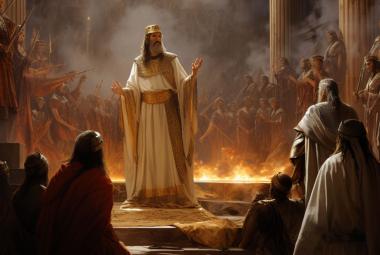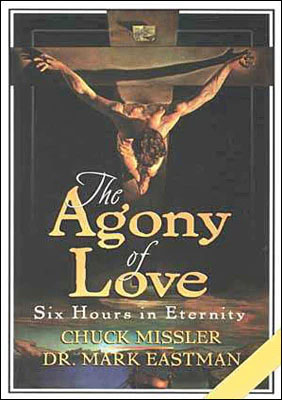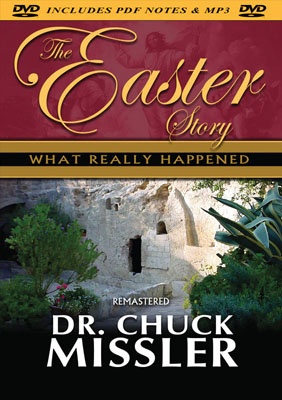Each Easter season we celebrate the series of injustices that led to the conviction of the innocent and the acquittal of the guilty. There were six trials that fateful night: three Jewish trials— before Annas,1 before Caiaphas,2 and before the Sanhedrin;3 and three Roman trials—before Pilate,4 before Herod,5 and then again before Pilate.6
It is particularly disturbing to discover that virtually every legal detail was contrary to the prevailing laws which had been designed to protect the innocent.
Legal Irregularities
The binding of a prisoner before he was condemned was unlawful unless resistance was offered or expected. Jesus offered none.7 It was illegal for judges to participate in the arrest of the accused.8
No legal transactions, including a trial, could be conducted at night.9 The arrest was effected through the agency of an informer and traitor.10 While an acquittal could be pronounced the same day, any other verdict required a majority of two and had to come on a subsequent day.11
No prisoner could be convicted on his own evidence.12 It was the duty of a judge to see that the interest of the accused was fully protected.13 Preliminary hearings before a magistrate were completely foreign to the Jewish legal system.14
It was illegal to carry weapons on a feast day.15 The use of violence during the trial was apparently unopposed by the judges.16 It was illegal to conduct a session of the court on a feast day.17 The judges sought false witnesses against Jesus.18 In a Jewish court, the accused was to be assumed innocent until proven guilty by two or more witnesses.19 The Jews failed to find two witnesses agreeing against Jesus.20 When the witnesses first disagreed, the prisoner should have been released.21 No witness was ever called for the defense.22
The trial under Caiaphas took place in his home rather than the council chamber where it should have been held.23 The Court lacked the civil authority to condemn a man to death.24
The high priest rent his garment. He was never permitted to tear his official robe. (If he did not have on his priestly robe, he couldn’t have put Christ under oath.)
A guilty verdict was rendered without evidence.25 The balloting was illegal. It should have been by roll with the youngest voting first. Here it is simultaneous.26 The sentence was finally passed in the palace of the high priest, but the law demanded it be pronounced in the Temple, in the hall of hewn stone.27
Why No Defense?
We often ponder the fact that no defense was made. This was, of course, according the prophecies of the Old Testament: “He opened not His mouth.”28 Do you know why? Because He was in our shoes: and we are guilty.
It is significant that He was pronounced innocent by the personal representative of the ruler of the world.29 Even Satan, having entered into Judas, declared His innocence.30 To fully understand our own predicament, we need to examine more carefully Barabbas!
The Gospel According to Barabbas
The substitution of Barabbas over Jesus before Pilate on that fateful day has profound implications for each of us. It is illuminating to examine the contrast between the two accused more closely:
- Barabbas stood under the righteous condemnation of the law.
- Barabbas knew the One who was to take his cross and take his place was innocent.
- Barabbas knew that Jesus Christ was for him a true substitute.
- Barabbas knew that he had done nothing to merit going free while another took his place.
- Barabbas knew Christ’s death was for him perfectly efficacious.
Barabbas and Jesus changed places!
The murderer’s bonds, curse, disgrace, and mortal agony were transferred to the righteous Jesus; while the liberty, innocence, safety, and well-being of the immaculate Nazarene became the lot of the murderer. Barabbas is installed in all the rights and privileges of Jesus Christ; while the latter enters upon all the infamy and horror of the rebel’s position. Both mutually inherit each other’s situation and what they possess: The delinquent’s guilt and cross become the lot of the Just One, and all the civil rights and immunities of the latter are the property of the delinquent.31
We, you and I, are also now in Barabbas’ shoes!
What is our response? Is that redemption the most important priority in your life? Your own personal “verdict” regarding that fateful day is the most important decision in your life. And it isn’t as simple as a “once and for all” resolution: it should include a moment-by-moment reprioritization of everything in your life. And, it will determine your eternal destiny.
Commit some serious time to reflect on all this during this very special season of the year. Baruch HaShem!
This article was excerpted from the briefing packages, The Agony of Love and The Easter Story and is heavily indebted to the work by John W.Lawrence, The Six Trials of Jesus, Kregel Publishing Co., Grand Rapids MI, 1996.
Notes:
- John 18:12-14.
- John 18:19-24.
- Matthew 27:1,2.
- John 18:28-38.
- Luke 23:6-11.
- John 18:39-19:16.
- John 18:12, 24.
- John 18:3.
- John 18:28.
- John 18:5; Ex 23:6-8.
- Matthew 26:65,66.
- Matthew 26:63-65.
- John 18:14.
- John 18:13.
- Matthew 26:47; John 18:3.
- John 18:22,23.
- John 18:28.
- Matthew 26:59; Mark 14:56.
- Mark 11:53.
- Mark 14:59.
- Mark 14:56-59.
- Isaiah 53:7.
- John 18:13-16.
- John 18:31.
- John 18:30.
- Matthew 26:66.
- John 18:28; (cf. Lev 21:10).
- Isaiah 53:7.
- John 18:38.
- Luke 22:3; Matthew 27:4.
- John W. Lawrence, The Six Trials of Jesus, Kregel Publishing Co., Grand Rapids MI 1996, p.181.








